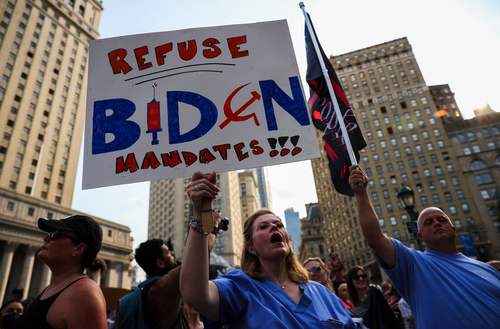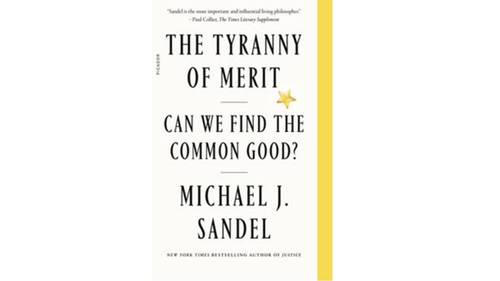Taibbi: Does America Hate The “Poorly Educated”?
Authored by Matt Taibbi via TK News,
It was impossible to mistake the tone of Joe Biden’s announcement of a vaccine mandate last week. It was an angry speech, which started by explaining that “many of us are frustrated with the nearly 80 million Americans who are still not vaccinated,” and went on to announce that “our patience is wearing thin,” and “your refusal has cost all of us.” Biden, not normally one for oratorial effects, even conveyed a sense of barely contained rage by muttering, “Get vaccinated!” as he walked off the stage.
“Enjoying the angry Dad vibes from this Biden speech,” came the cheerful comment of former Justice Department spokesman and MSNBC analyst Matthew Miller:
Enjoying the angry dad vibes from this Biden speech. He is turning the damn car around.
— Matthew Miller (@matthewamiller) September 9, 2021
Who’d attracted Biden’s anger — the unvaccinated — was clear. The why was more confusing. The president decried how “the unvaccinated overcrowd our hospitals… leaving no room for someone with a heart attack or pancreatitis or cancer,” a legitimate enough point. But after reassuring those who’d “done their part” that just “one out of every 160,000 fully vaccinated Americans was hospitalized” this summer, Biden nonetheless explained that “a distinct minority of Americans” is “causing unvaccinated people to die.” He added: “We’re going to protect the vaccinated from unvaccinated co-workers.”
As many noted, the statements were contradictory. If the vaccine really is that effective, the overwhelming consequences of of any failure to get vaccinated will be borne by the unvaccinated themselves. But Biden’s speech was as much about directing anger as policy. The mandate was an extraordinary step, but Biden’s unique — and uniquely strange — rhetorical setup, which framed the decision as a way to stop “them” from doing “damage” and killing “us,” was just as big a story.
The arrival of Covid-19 has exacerbated a troubling divide that’s been growing in America for decades, and is elucidated at length in Michael Sandel’s recent The Tyranny of Merit. The book tells a politically unsettling story about meritocracy in America, one that runs counter to prevailing narratives on both the left and the right. Though mention of Covid-19 is limited to a few paragraphs in a new prologue, the pandemic in many ways has become the ultimate test case of Sandel’s thesis: that we Americans have been so conditioned to believe that winners deserve to win that we’ve found ways to hate losers of any kind as moral failures, even when life is at stake, and especially when lack of education is seen as a factor.
It’s not remotely the same kind of book, but The Tyranny of Merit does follow up on themes in Christopher Lasch’s The Culture of Narcissism. Lasch’s late seventies premise described American society devolved into a ceaseless all-against-all competition on all fronts, from the professional to the physical to the social and sexual and beyond. Moreover, Lasch wrote, if the original “American dream” was imbued with at least some vague ideas that success should be tied to virtues like thrift, discipline, and wisdom, by the disco age “the pursuit of wealth lost the few shreds of moral meaning.”
In the time since Lasch’s iconic treatise, though, relentless messaging campaigns emanating from both sides of the political aisle re-emphasized the idea that material success was tied to moral character. Ronald Reagan evangelized the idea that poverty was mostly a deserved state, and government at most owed those who weren’t to blame for their own problems. When Bill Clinton came along, he took Reagan’s finger-wagging moralizing and re-cast it in the cheery new technocratic language of global capitalism. “We must do what America does best,” Clinton said at his inauguration. “Offer more opportunity to all and demand more responsibility from all.”
Clinton’s formula was really Yin to Reagan’s Yang: in a world that offered more “opportunity,” there was now even less excuse for failure. We forget, because the pre-9/11 world seems so long ago, but Clinton-era editorialists spent much of the late nineties hyping the opportunity gospel. We were told a combination of the Internet and an increasingly integrated international economy created vast new worlds of material possibility, for those willing to “fill the unforgiving minute” and run the race. “If globalization were a sport,” wrote an exultant Thomas Friedman in 1999, “it would be the 100-yard dash, over and over and over. And no matter how many times you win, you have to race again the next day.”
Onetime labor parties paradoxically were the biggest boosters of the new hyper-competitive global economy, whose central feature was forcing Western workers to face off against masses of laborers in China, South Asia, Mexico, and other places where political rights were, shall we say, less of a priority. As the stress on former blue-collar workers intensified, politicians often sold the public on the idea that higher learning was their Golden Ticket out of the miseries of debt, higher medical costs, and especially social immobility.
By the time Barack Obama came along, it was axiomatic among the cosmopolitan set that anyone with enough ingenuity and entrepreneurial energy should be able to get ahead. Sandel amusingly points out that Obama often culled from a Sly and the Family Stone song in describing his vision of modern American capitalism, using the phrase “You can make it if you try” 140 times during his presidency:
The explosive and uncomfortable message at the heart of The Tyranny of Meritocracy is the idea that the resulting political divide is now less about ideology than education. Sandel deserves credit for taking on a subject that almost no one in high society wants to hear about, let alone those in the academic world. Forget red versus blue: he shows the real gulf is between those who have diplomas, and those who don’t. The subtext is that people with the right degrees deserve to be rich, and have health insurance, and good schooling for their kids, and dignified work, while those who threw away their books after high school deserve failure, in the same way smokers deserve lung disease — especially if they make unsanctioned political choices.
This is an excerpt from today’s subscriber-only post. To read the entire article and get full access to the archives, you can subscribe for $5 a month or $50 a year.
Tyler Durden
Sat, 09/18/2021 – 19:30![]()
Zero Hedge’s mission is to widen the scope of financial, economic and political information available to the professional investing public, to skeptically examine and, where necessary, attack the flaccid institution that financial journalism has become, to liberate oppressed knowledge, to provide analysis uninhibited by political constraint and to facilitate information’s unending quest for freedom. Visit https://www.zerohedge.com

